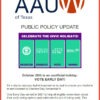This is the current Special session and AAUW concerns. If you have time please respond by contacting your representative. NOTE that redistricting is a political position and must be from you NOT as a representative of AAUW. The other positions are where AAUW stands on the issue. As always check the LWV site for other positions you may support or oppose and use their TAKE ACTION.
Cheers and welcome to the life of a Texan,
Melanie
8/19/25 G. Kimmel
The 89th 2nd Called Special Session began Friday, August 15, and has the same agenda as the 1st Called Special Session. Bill numbers changed as an item was added to the agenda.
Status of bills of interest from the Special Session #1: Most Senate bills completed the process are or will be heading to the House. However, all legislation must go through the steps, very (perhaps extremely) streamlined. Speaker’s goal is to have the session end by Labor Day!
NOTE: SB 4 Redistricting Partisan issue contact representatives only personally https://comments.house.texas.gov/home OR https://senate.texas.gov/redistrictingcomment
SB 7 Woman and Child Protection or Act Protect Unborn Children – Abortion pill OPPOSE
A bill to further restrict access to abortion pills, which are already illegal to mail to the state. The bill allows private citizens to file lawsuits against abortion manufacturers and target shield laws in other states that protect manufacturers and doctors who prescribe the pills. It including civil liability for the manufacture and provision of abortion-inducing drugs, exemptions from the Texas Citizens Participation Act and Religious Freedom Restoration Act, authorizing civil and qui tam actions, amendments to the fee-shifting statute governing abortion litigation, immunity defenses and limits on state-court jurisdiction and relief, the parens patriae standing of the attorney general, and the jurisdiction of the Fifteenth Court of Appeals; providing for severability. (In plain language, this means a person can refuse to comply with a law they oppose on religious grounds, assert their religious beliefs as a defense against any attempt to enforce the law, and sue the person (including a government official) who tried to enforce the law to recover damages and court costs that the enforcement action inflicted on them. This chips away at religious freedom. Voted out of Senate committee 8/15/25.
SB 8 Protect Women’s Spaces / HB 32 Bathroom Bill OPPOSE
Relating to the designation and use of certain spaces and facilities according to sex; authorizing a civil penalty and a private civil right of action. Voted out of Senate committee 8/15/25.
SB 9 Eliminate STARR Test SUPPORT
The identical Senate Bill 8 (SB 8) and House Bill 8 (HB 8) were being described as significant steps in Texas assessment reform, but both leave major elements of the current state testing system unchanged. Under both proposals, STAAR continues in all grades and subjects until at least the 2027–28 school year, and the A-F accountability system still remains almost entirely dependent on the criterion-referenced, one-day one-test model.
While SB 8 and HB 8 allow districts to use either the Texas Education Agency’s (TEA) Beginning and Middle of Year formative assessments or select from an approved vendor list, the End of Year test remains criterion-referenced and not nationally normed. This limits comparability to other states and delays the use of a full growth-based model until 2032–33 under the provisions in the bill language.
Most districts already use formative assessments, such as MAP Growth or Renaissance, during the school year to track student progress and guide instruction. These local assessments give teachers timely feedback and often align more closely to classroom learning than the state’s end-of-year measure. While SB 8 and HB 8 acknowledge the value of measuring growth over time, the legislation requires two additional state tests, and it is not clear how TEA intends to integrate these assessments into the state accountability system.
The bills also do not add any new indicators to the state’s A–F accountability system. The new proposal directs TEA to collect data on student engagement and workforce development measures, but this information is for reporting purposes only and is not included in campus or district ratings. Participation in providing these measures is optional for school districts, meaning the accountability framework will continue to rely on its current set of indicators.
Assessment and accountability remains central to how local communities understand school performance, how districts plan and allocate resources, and how the Legislature evaluates the impact of state education policies. These systems shape public confidence in schools, influence budget and staffing decisions, and drive program improvements.Voted out of Senate committee 8/15/25.
SB 11 Protect Human Trafficking Victims SUPPORT
Senate Bill 11 would shield victims from prosecution from some crimes if they’re threatened or coerced into the act by their trafficker. Relating to an affirmative defense to prosecution for certain victims of trafficking of persons or compelling prostitution. The victim would not have engaged in the conduct that is the subject of the prosecution but for the use of force, fraud, or coercion; and the use of force, fraud, or coercion would have compelled a reasonable person in the victim’s circumstances to engage in the conduct.Passed by Senate 8/18/25.
SB 12 Expanding Attorney General ‘s power regarding election enforcement OPPOSE
Relating to the duty of the attorney general to prosecute criminal offenses prescribed by the election laws of this state. House Joint Resolution 1 and House Bill 11 would regrant the Texas Attorney General the power to independently prosecute election fraud — authority the office lost in 2021 when the Texas Court of Criminal Appeals struck it down after more than 70 years.
Texas voters could soon see the state’s top law enforcement officer regain the power to independently prosecute election fraud. Some voting rights advocates have said giving the Texas attorney general more power over local law enforcement offices is unconstitutional and warned that the bill seemed aimed at increasing election prosecutions, and potentially intimidating voters and local election officials.Voted out of Senate committee 8/15/25.
SB 13 Community Censorship Bill Relating to the use by a political subdivision of public funds for lobbying activities. OPPOSE
This bill seeks to institute a ban on lobbying for some entities (like public schools) and not others (like charter and private schools that will receive public funds). Bill would drastically limit the ability of leaders to advocate for what’s best for schools and communities. Silencing local government voices—key partners for place-based ministries— and limiting representation of local communities at the Capitol. It Prohibits school districts, cities, and counties from using public funds to hire or contract with lobbyists or join associations that hire or contract with lobbyists to advocate for them.It does NOT restrict private school lobbying efforts.Does not apply to charter schools, private schools receiving public funds through Education Savings Account vouchers, nor the associations that represent them.
Bills like this pick winners and losers—silencing political subdivisions and protecting the ability of other schools and advocacy groups to lobby at the Capitol. At a minimum, the bill should hold all entities receiving taxpayer funds to the same standard as public school districts—anything less is community censorship. Bill failed to pass the Senate.
Action item regarding a law passed during the regular 89th legislative session that goes into effect September 1:
SB 13 requires districts to have a new acquisition policy for school library materials before the start of the school year, figure out how to post lists of books for purchase for a 30 day public comment period, update collection development policies to include prohibiting material that meets the FCC broadcast definition of profane or indecent, decide whether or not to establish a politically appointed local school library advisory council, and update technology as needed to ensure parents have access to their children’s library records and can submit a list of books they don’t want their child to checkout.
Right now, school boards across the state are meeting to vote on new policies that will determine how efficiently and effectively your school library will operate. Will librarians have to spend much of their valuable time on administrative tasks, or will they be able to focus on the creative programming and valuable support students need and deserve?
What you can do:
1) Attend your local school board meeting and ask that they adopt policies that allow librarians, not a small group of politically appointed parents, to recommend and select books for the library.
2) If your district does create a Local School Library Advisory Council, apply to serve.







